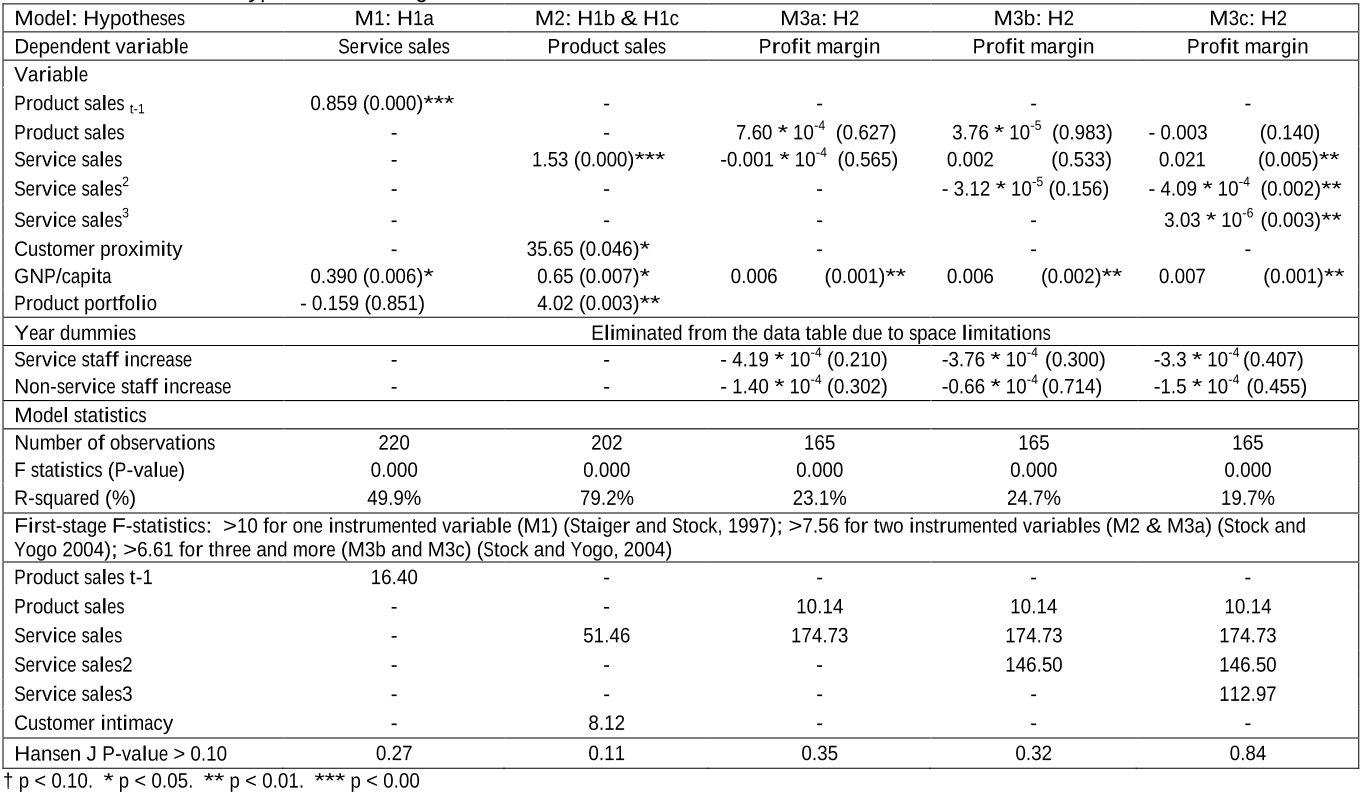Servitization: Disentangling the impact of service business model innovation on manufacturing firm performance
TLDR
In this paper, the authors analyzed the value creation and value appropriation processes of 44 national subsidiaries of a global manufacturing firm turned product-service provider, in the 2001-2007 period, and found that the firm under study is able to successfully transcend the inherent substitution of products by services and to enact complementary sales dynamics between the two activities.About:
This article is published in Journal of Operations Management.The article was published on 2013-05-01 and is currently open access. It has received 584 citations till now. The article focuses on the topics: Service (business) & Profitability index.read more
Figures

Table 3. Results from Hypotheses Testing 
Figure 1. Relationship between service scale and subsidiary profit margin* 
Table 1.a Overview of the variables and their use 
Table 1.a Overview of the variables and their use 
Table 2. Summary statistics and correlation coefficient No Variable Obs Mean SD Min Max 1 2 3 4 5 6 7 8 9 10 11 12 13 14
Citations
More filters
Journal ArticleDOI
Exploring the journey to services
TL;DR: In this paper, the authors analyze the actual service journeys of three firms in the well-being, engineering and learning sectors and provide empirical evidence to support a contingency view of the dominance and sequencing of the different process models of change across the change journey.
Journal ArticleDOI
Supply chain sustainability and performance of firms: A meta-analysis of the literature
TL;DR: In this paper, the authors used a psychometric meta-analysis to synthesize the results from 167 effect sizes, collected from 129 articles, to understand the impact of various types of sustainability practices (i.e., environmental, social, and combined) on firm performance.
Journal ArticleDOI
From service for free to service for fee: business model innovation in manufacturing firms
Lars Witell,Martin Löfgren +1 more
TL;DR: In this article, the authors identify how business model innovation can be used to make the transition from service for free to service for fee, and in particular, the focus is on how to transition from free to fee.
Journal ArticleDOI
Exploring servitization through the paradox lens: Coping practices in servitization
TL;DR: In this paper, the authors identify four paradoxes in servitization: effectiveness in the customization of solutions vs. efficiency in product manufacturing, building a customer orientation vs. maintaining an engineering mindset, organizing product and service integration vs. separated services and product organizations, and exploratory innovation in solutions versus.
Journal ArticleDOI
The impact of servitization on firm performance: a meta-analysis
TL;DR: In this paper, a meta-analytic approach was adopted to conduct a quantitative review on the relationship between servitization and firm performance, and the results revealed that the observed servitisation-performance relationship is influenced by the operationalization of constructs and control variables (industry and region).
References
More filters
Book ChapterDOI
Firm Resources and Sustained Competitive Advantage
TL;DR: In this article, the authors examined the link between firm resources and sustained competitive advantage and analyzed the potential of several firm resources for generating sustained competitive advantages, including value, rareness, imitability, and substitutability.
Book
Econometric Analysis of Cross Section and Panel Data
TL;DR: This is the essential companion to Jeffrey Wooldridge's widely-used graduate text Econometric Analysis of Cross Section and Panel Data (MIT Press, 2001).
Journal ArticleDOI
Dynamic capabilities and strategic management
TL;DR: The dynamic capabilities framework as mentioned in this paper analyzes the sources and methods of wealth creation and capture by private enterprise firms operating in environments of rapid technological change, and suggests that private wealth creation in regimes of rapid technology change depends in large measure on honing intemal technological, organizational, and managerial processes inside the firm.
Journal ArticleDOI
Some Tests of Specification for Panel Data: Monte Carlo Evidence and an Application to Employment Equations.
Manuel Arellano,Stephen Bond +1 more
TL;DR: In this article, the generalized method of moments (GMM) estimator optimally exploits all the linear moment restrictions that follow from the assumption of no serial correlation in the errors, in an equation which contains individual effects, lagged dependent variables and no strictly exogenous variables.
Related Papers (5)
Exploring the financial consequences of the servitization of manufacturing
Andy Neely,Andy Neely +1 more